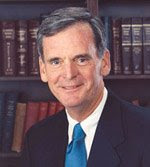
In a meeting with editors from the
Keene Sentinel, New Hampshire Senator Judd Gregg (R) had some interesting things to
say about nuclear energy's future in the state and Senate.
“If we move forward aggressively with the policy of producing more American energy and conserving more American energy, and show the world that we’re serious about the supply side, that will lead to further reduction in the price of oil,” Gregg said. “And that will take pressure off the economy, which is really reeling from the huge increase in energy costs.”
The energy policies of those in government are beginning to move in a similar direction despite partisan differences, he said.
“There’s always been consensus on conservation and renewables,” Gregg said. “Now we’re seeing some consensus develop around production.”
Along with gas, and oil from offshore drilling, Gregg said nuclear energy should have a role.
“We have not lost a single life to nuclear power in this country,” Gregg said. “We are running nuclear power plants all over this country, and we’re running a navy that’s nuclear generated. So we know how to deal with nuclear energy. We know how to make it safe. And we know how to produce it.
“Yes, nuclear power plants have a life expectancy, and at the end of their life expectancy they get shut down,” he said. “We just shut one down in Maine, for example.”
Vermont Yankee, a nuclear power plant in Vernon, Vt., is set to have its operating license expire in 2012. Plant owner Entergy Nuclear is seeking permission to extend its license another 20 years.
“If they can do it safely, they should do it,” Gregg said.
“We haven’t licensed a plant for 27 years,” he said. “The last one to come online was Seabrook (N.H.). Seabrook’s now been operating for almost 20 years, without any problems, generated a lot of electricity and been a very efficient way for us not to buy oil.
Gregg said legislators should consider whether another nuclear power plant at Seabrook would be appropriate.
“We should be using more nuclear power,” he said. “It is clean. It does not affect the global environment. And it is domestic.”
 In a meeting with editors from the Keene Sentinel, New Hampshire Senator Judd Gregg (R) had some interesting things to say about nuclear energy's future in the state and Senate.
In a meeting with editors from the Keene Sentinel, New Hampshire Senator Judd Gregg (R) had some interesting things to say about nuclear energy's future in the state and Senate.
Comments